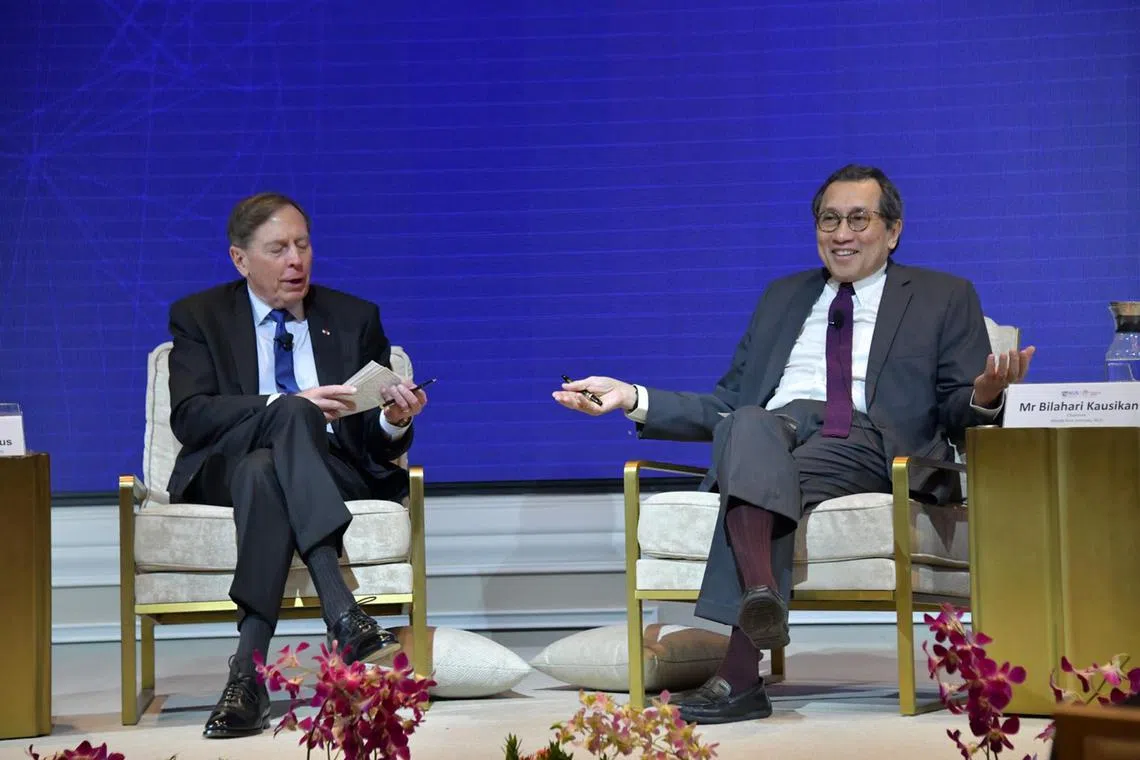Countering Hamas requires making life better for Palestinians, says retired US general Petraeus
Sign up now: Get ST's newsletters delivered to your inbox

Retired US army general David Petraeus with Middle East Institute chairman Bilahari Kausikan at the Middle East Institute’s S R Nathan Distinguished Lecture.
PHOTO: MIDDLE EAST INSTITUTE, NUS
SINGAPORE - The United States’ experience with Al-Qaeda in Iraq is a cautionary tale for Israel as it battles Hamas today, said retired US army general David Petraeus.
Although Al-Qaeda in Iraq was largely decimated by US-led forces in the mid-2000s, it eventually re-emerged as ISIS, or the Islamic State in Iraq and Syria.
To avoid a situation where a Hamas rooted out by Israel later reconstitutes, it is not just the physical presence of the extremist group that needs to be addressed, said Gen Petraeus, as he gave the Middle East Institute’s S R Nathan Distinguished Lecture on Dec 13.
The lecture, held at Orchard Hotel, drew an audience of several hundred diplomats, academics and members of the public, both in person and online.
The military veteran of more than 37 years and former director of the Central Intelligence Agency said that the very idea of Hamas must also be combated, and this can be done by making life better for the Palestinian people than it was under Hamas’ rule.
Hamas governed the 2.3 million people in the Gaza Strip before the war, while its rival, the Palestinian Authority, rules parts of the West Bank, which houses about three million Palestinians.
Israel launched a military offensive in the Gaza Strip aimed at destroying Hamas,
Gen Petraeus, 71, who commanded the coalition forces in Iraq during the US troop surge from 2007 to 2008, said that the ongoing conflict is not a conventional war.
“It is probably better to think about it as a counter-insurgency campaign,” he said, which refers to military action against an extremist subset of the population, in this case, Hamas.
“Because then you’re very conscious of the need to deal with hearts and minds, and to ensure that there are plans to very rapidly provide humanitarian assistance, restore basic services, and begin reconstruction,” he added. He noted that US leaders had conveyed to Israel the need to keep collateral damage and civilian casualties to a minimum.
It bears remembering that “there is no great love of Hamas within Gaza”, he said. “People know who has brought this violence and destruction and death on them.”
A poll conducted by research network Arab Barometer in Gaza just days before the Oct 7 attack found that 44 per cent of respondents had no trust at all in the Hamas authorities, while 23 per cent had “not a lot of trust”.
Gen Petraeus, who is now a partner at global investment firm KKR and chairman of the KKR Global Institute, added that a crucial question yet unanswered was on the governance of Gaza after the war.
“The goal eventually is to have a competent, capable and trustworthy Palestinian entity that can oversee the Palestinians in Gaza,” he said, but noted that no such entity was currently available.
“No Arab country wants to volunteer to take this mission on,” said Gen Petraeus, adding that he did not see any international organisation eager to do so as well. In the absence of a viable alternative, he said Israel may have to govern a post-war Gaza at least for some time, even as “nobody wants to see Israel reoccupy Gaza, including the Israelis”.
Some bureaucrats who had been employed by the Hamas-run government would also have to be retained to repair and provide essential services in a post-war Gaza, he said, noting that the US’ firing of bureaucrats from the Saddam Hussein-led Ba’ath party early in its occupation of Iraq proved to be a mistake as it sought to run a country it did not sufficiently understand.
Chairman of the Middle East Institute and retired Singapore diplomat Bilahari Kausikan, who moderated the lecture, asked whether there was a viable pathway to a two-state solution.
Noting that any such solution required stability, he said that Israel’s bid to restore stability and deterrence in the wake of the Oct 7 attack would make a pathway even more complicated, at least in the immediate future.
Gen Petraeus said there was no alternative to a two-state solution.
While acknowledging that Palestinian and Israeli leaders had not yet been able to make the requisite compromises to this end, he said all parties should “at least try to contribute to the conditions that could enable an eventual two-state solution”.
These include helping to build up the Palestinian Authority’s institutions in addition to its security forces, strengthening the economy and education system there, and avoiding moves that would create more obstacles to said solution, he added.


